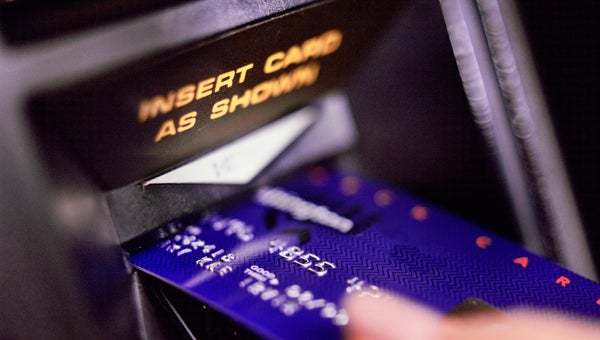FRAUDULENT: Debit card fraud has deep costs
Published 8:35 pm Saturday, August 8, 2015
The unsuspecting victim pays at the pump, gets cash from an outdoor ATM or, perhaps, makes a point of sale purchase swiping his or her debit card. From there, events escalate quickly: the card number is recorded and sold. A new card is used to make purchases far away. The victim’s bank account is drained in $500 increments until the money is gone or the transactions are noticed.
“I think one of the biggest things that we see is ‘card not present’ debit card fraud. This is basically when a fraudster is able to obtain information on a debit card,” said Sherry Correll, executive vice president of bank operations at First South Bank. “Then our customer looks online and sees $500 come out and they will contact us. We see fraud like that every day.”
Terminals at retail stores are switched out with card readers that record card number; devices called skimmers are attached to unmanned card readers like those commonly found at gas stations; card numbers are swiped through handheld skimmers by dishonest wait staff when the check is being paid at a restaurant; websites with low security are hacked — these are just some of the ways in which card numbers can be stolen.
Victims report the fraud to the bank in order to recoup their money — at First South Bank they have up until 60 days after the first fraudulent transaction occurred to report the incident, Correll said. But reporting the crime to law enforcement is secondary and often doesn’t happen, which means a skimmer attached to a local, unmanned machine can claim victim after victim, according to officials.
“All we can do is encourage people to report it,” said Lt. William Chrismon, spokesman for the Washington Police Department.
Chrismon said that’s the information detectives need in order to track down and find out if a certain machine at a specific location is responsible for thefts.
While Correll said the bank encourages victims to make police reports, federal regulations prohibit banks from requiring that a victim make a report. In First South’s case, they report their losses to Visa, not to law enforcement.
But Chrismon said any information is useful, even if a debit card fraud victim does not want to file a report, especially if it’s happened locally, rather than out of state or even out of the country. All a victim has to do is call police and share any suspicions about where the fraud may have occurred.
“Definitely, if you’ve got money missing, especially if it’s local use, report it to us as soon as possible so we can try to get on it as soon as possible,” Chrismon said.
No bank is able to prevent fraud, but Correll said there are many measures in place to shut the siphoning of money down once it occurs. First South uses a neural network-based fraud detection that analyzes every transaction, scoring each as a low-, medium- or high-risk transaction. High-risk transactions set security in motion — for example, repeated transactions at the same retailer.
“Three times within a 30-minute period? It’s going to alert. We’re going to be notified and our customers are going to be notified. Then we’re in a position to block that card,” Correll said.
There are other ways for cardholders to be proactive, Correll said. If using a debit card to make online purchases, there is a service called Verified by Visa (to be replaced with Visa Checkout in September) that makes online purchases more secure.
“They can register their card so that it adds an extra layer of security when they make purchases online, and we encourage that,” Correll said. “That’s one way they can safeguard their card. Also, through our mobile app, they can suspend their card and turn it back on as they need to.”
Lt. Wesley Waters, spokesman for the Beaufort County Sheriff’s Office, advised card users to be cautious of where they make transactions.
“If the debit-card reader looks like it’s been tampered with or broken, be cautious with it. I probably would not use it if it looks like it’s been tampered with. That’s when I would notify the business,” Waters said.
Correll said cardholders also should look for any device that appears to have been attached to a machine, whether at a gas station or an outdoor ATM. She said skimmers have never been found at any First South ATMs.
“But it’s something that we’re very cognizant of and we check for daily to protect our customers and noncustomers who use our machines,” Correll said. “Hopefully, retailers are checking for skimmers every day.”
Correll decline to say how much money First South loses through debit card fraud.
“I will tell you it is a lot of money for financial institutions. Most people think that Visa absorbs that loss, but they don’t. The financial institutions absorb the cost,” she said. “That’s why everyone is looking forward to the EMV cards and we’re hopeful that that is going to stop some of the fraud that we see today.”
EMV cards are a new global standard in which, when used, a microchip in the card creates a one-time transaction code that cannot be used again — unlike the unchanging data found in magnetic strips on traditional credit and debit cards. Even if the transaction code is stolen, the card will be denied. First South is on a waiting list with Visa to make the transition to EMV cards. Once that’s done, all First South customers will receive new cards, Correll said.
“We’re hoping for soon,” she said.





